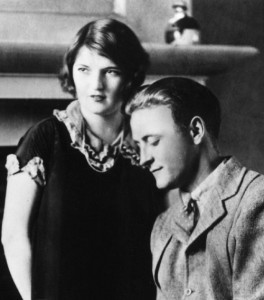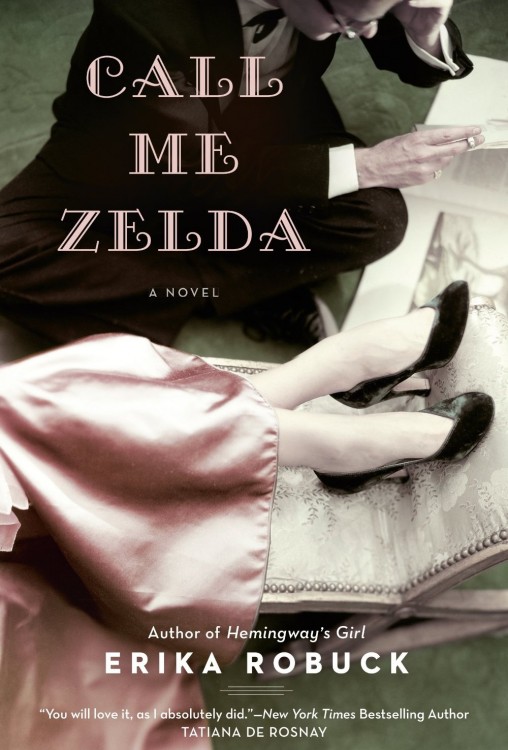Novel Spotlights Fitzgeralds’ Bermuda Sojourn
 “Jazz Age” supercouple Scott and Zelda Fitzgerald‘s real-life 1933 Bermuda vacation provides the inspiration for one of the most pivotal episodes in a newly-published fictionalised account of their tumultuous relationship.
“Jazz Age” supercouple Scott and Zelda Fitzgerald‘s real-life 1933 Bermuda vacation provides the inspiration for one of the most pivotal episodes in a newly-published fictionalised account of their tumultuous relationship.
Told from the perspective of a nurse caring for Zelda — and taking place in swinging speakeasies, the ivy-covered arches of Princeton University and on a Bermuda beach — American author Erika Robuck’s novel
“Call Me Zelda” explores the bonds of female friendship and the kind of love that is worth dying for.
“My favorite scene in ‘Call Me Zelda’ takes place in Bermuda in 1933, when Scott and Zelda [pictured here] took a trip to try to reconnect,” said Ms Robuck in a recent interview. “In the scene, my fictional nurse Anna is awoken by Zelda in the middle of the night because Scott’s pleurisy, among other things, is driving her mad.
“The nurse encourages Zelda to go outside for a walk to calm her nerves, but Zelda ends up naked in the sea. Anna feels that she must follow her, and because she is not a good swimmer, and the current is so strong, Zelda ends up having to save her.
“When they get back to the beach, Zelda points to the water and tells Anna that the panic Anna has just endured is the way Zelda always feels. It represents a role reversal, and the dawning of true understanding and empathy on the nurse’s part.”
“Call Zelda” has been well received by critics, with one reviewer calling Ms Robuck’s book
“[a] haunting and beautifully atmospheric novel … brilliantly brings Scott and Zelda Fitzgerald to life in all their doomed beauty, with compelling and unforgettable results.”
Maryanne O’Hara, bestselling author of “Cascade”, said “a sense of the uncanny haunts Erika Robuck’s poignant, compassionate portrait of Zelda Fitzgerald’s desperate dance with mental illness … mesmerising, page-turning, [the book] provides us with a fresh, very human look at two literary icons.”
The complex marriage of Scott and Zelda Fitzgerald — marred by his alcoholism, her mental health problems and mutual bouts of jealousy — has become emblematic of America’s inter-war “Jazz Age” the celebrity couple helped to create and popularise.
“Great Gatsby” author Scott Fitzgerald brought his Southern-born wife — a novelist. artist and dancer in her own right — to Bermuda on the advice of her doctors.
“For years we had wanted to go to Bermuda,” she recorded in her journal. “[In 1933] we went.
“The Elbow Beach Hotel was full of honeymooners, who scintillated so persistently in each other’s eyes that we cynically moved.
“The Hotel St. George was nice. Bougainvillea cascaded down the tree trunks and long stairs passed by deep mysteries taking place behind native windows. Cats slept along the balustrade and lovely children grew.
“We rode bicycles along the wind-swept causeways and stared in a dreamy daze at such phenomena as roosters scratching amidst the sweet alyssum …”
Film and photographic glimpses of F. Scott and Zelda Fitzgerald
Scott Fitzgerald — who finished the final revisions to his masterpiece “Tender In The Night” — died of a heart attack in Los Angeles in 1944 at the age of 44.
His widow, hospitalised in North Carolina because of her mental illness, was not allowed to attend his funeral.
Zelda Fitzgerald survived her husband by just four years.
In 1948 she was killed when a fire raced through the Asheville institution where she was being treated.
Locked in a room awaiting electroshock therapy, she was unable to escape the blaze.
Just 47-years-old at the time of her death, Zelda Fitzgerald posthumously found a new role: after a popular 1970 biography portrayed her as a victim of an unsympathetic husband and an indifferent medical system, she became a feminist icon.
She was inducted into the Alabama Women’s Hall of Fame in 1992.
“Call Me Zelda” can be ordered through Bermuda bookstores or ordered from various on-line vendors.
Read More About
Category: All, Entertainment


